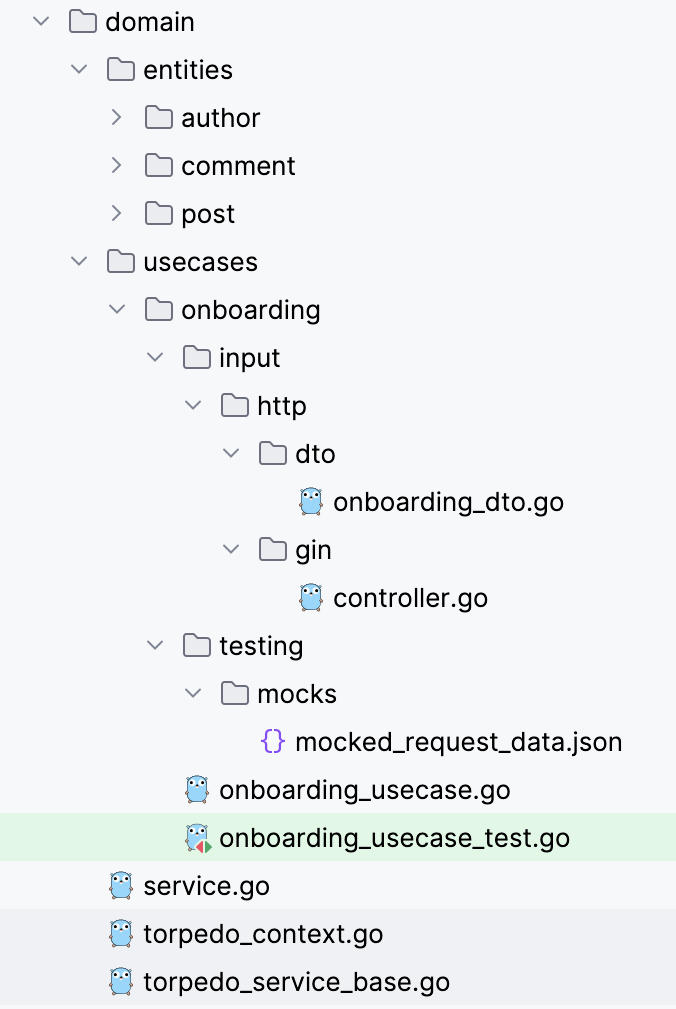Improve your time, avoid the boiler plate!
Entity Data Model Spec
Define your entities based on a yaml spec file and generate voiler plate code from it.
version: "torpedo.darksub.io/v1.0"
kind: entity
entity:
name: "post"
plural: "posts"
description: "The blog post entity"
doc: ".torpedo/entities/docs/post.md" # custom md to extends basic doc.
Updates the spec when you need a change and rewrite your code faster with minimal impact.
schema:
reserved:
id:
type: ulid
fields:
- name: title
type: string
description: "The post title"
doc: "The post title"
- name: pubDate
type: date
description: "The publication date"
doc: "The publication date"
Defines relationshipts between entities
relationships:
- name: comments
type: $rel
ref: ".torpedo/entities/comment.yaml"
cardinality: hasMany
- name: authors
ref: ".torpedo/entities/author.yaml"
cardinality: hasMany
Handle input adapters like Http Rest or output adapters like SQL, MongoDB, Redis or Memory
adapters:
input:
- type: http
output:
- type: sql
metadata:
table: "posts"
Use Cases first
Based on the Hexagonal Architecture Torpedo lets developer be focused on the Business Logic.
Isolating the use case code base, unit tests, mocks, 3rd party integrations and more as part of the project structure is a really powerfull way to handle your entities code away from your business logic

Output Adapters: Storages
Torpedo provides integration out of the box with the most poppular databases.
Entities can be saved into:
- SQL (MySQL, PostgreSQL, etc.)
- MongoDB
- Redis
- Memory (usefull for testing)
Additionally, provides a two flavours composition storage using Redis as cache layer to improve your reads
- Redis + SQL
- Redis + MongoDB
Configuration module
Configuration is not a problem for you anymore with the Torpedo config module.
Integrates out of the box with:
- Yaml files
- Azure App Config
- Azure Key Vault
- Environment variables interpolation
Application Context - Dependency Injection
The application module provides a full Application life-cycle handler with a context.
This application context handles all depedencies that you need pass throw services, modules, entities, etc.
Implements an easy programatic interface to provide your own depedencies.
Logger provider:
package inject
import "github.com/darksubmarine/torpedo-lib-go/app"
const LOGGER = "LOGGER"
type LoggerProvider struct {
app.BaseProvider
level string
}
func NewLoggerProvider(lvl string) *LoggerProvider {
return &LoggerProvider{level: lvl}
}
func (lp *LoggerProvider) Provide(lf app.IContainer) (interface{}, error) {
return slog.New(slog.NewJSONHandler(os.Stdout,
&slog.HandlerOptions{Level: lp.level})), nil
}
Creates the application and register the logger dependency:
package inject
import "github.com/darksubmarine/torpedo-lib-go/app"
func NewAppContainer() app.IApp {
return app.
NewContainer().
WithNamedProvider(LOGGER, NewLoggerProvider("info"))
}
Torpedo Query Language (TQL)
Because Torpedo let you switch from one database to another one, we have introduced a DSL query language to avoid code migration.
TQL defines a JSON based query language with next capabilities:
- Filtering
- Sorting
- Projection
- Pagination
curl \
--location 'http://service:8081/api/v1/post/query' \
--header 'Content-Type: application/json' \
--data '{
"filter": {
"type":"all",
"fields": [
{
"field": "authorId",
"operator": "==",
"value": "fe8e51a3-f897-4a3a-8b2b-87abdeb8d0d5"
}
]
}
,"projection":["id", "body","created","updated"]
}'